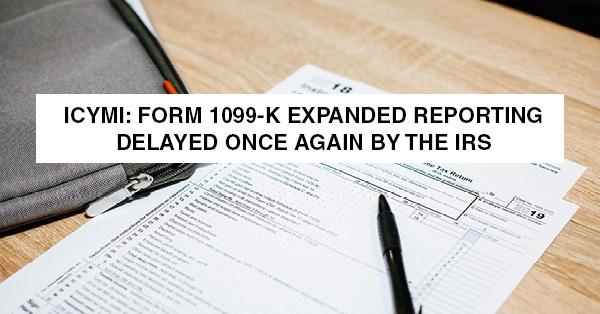ICYMI: FORM 1099-K EXPANDED REPORTING DELAYED ONCE AGAIN BY THE IRS

The IRS has once again postponed the implementation date for the expanded reporting requirements on Form 1099-K, as announced in Notice 2023-74. Previously, the IRS had deferred the effective date of Internal Revenue Code (IRC) §6050W(e), which was initially set to commence in 2022, extending it to 2023.
Additionally, in Fact Sheet 2023-27, the IRS indicated plans to implement a threshold of $5,000 for 2024 as part of phasing in the new law, though this planned threshold was not mentioned in the Notice.
The Fact Sheet offers the following interpretation of the Notice's provisions:
This means that for 2023 and prior years, payment apps and online marketplaces are only required to send out Forms 1099-K to taxpayers who receive over $20,000 and have over 200 transactions. For tax year 2024, the IRS plans for a threshold of $5,000 to phase in reporting requirements.
This phased-in approach will allow the agency to review its operational processes to better address taxpayer and stakeholder concerns.
Taxpayers should be aware that while the reporting threshold remains over $20,000 and 200 transactions for 2023, companies could still issue the form for any amount.
It’s important to note that the higher threshold does not affect the actual tax law to report income on your tax return. All income, no matter the amount, is taxable unless it’s excluded by law whether a Form 1099-K is sent or not.
The Fact Sheet continues by providing information regarding how taxpayers who receive a Form 1099-K should report the information on their income tax returns.
“We spent many months gathering feedback from third-party groups and others, and it became increasingly clear we need additional time to effectively implement the new reporting requirements,” IRS Commissioner Danny Werfel said. “Taking this phased-in approach is the right thing to do for the purposes of tax administration, and it prevents unnecessary confusion as we continue to look at changes to the Form 1040. It’s clear that an additional delay for tax year 2023 will avoid problems for taxpayers, tax professionals and others in this area.”




